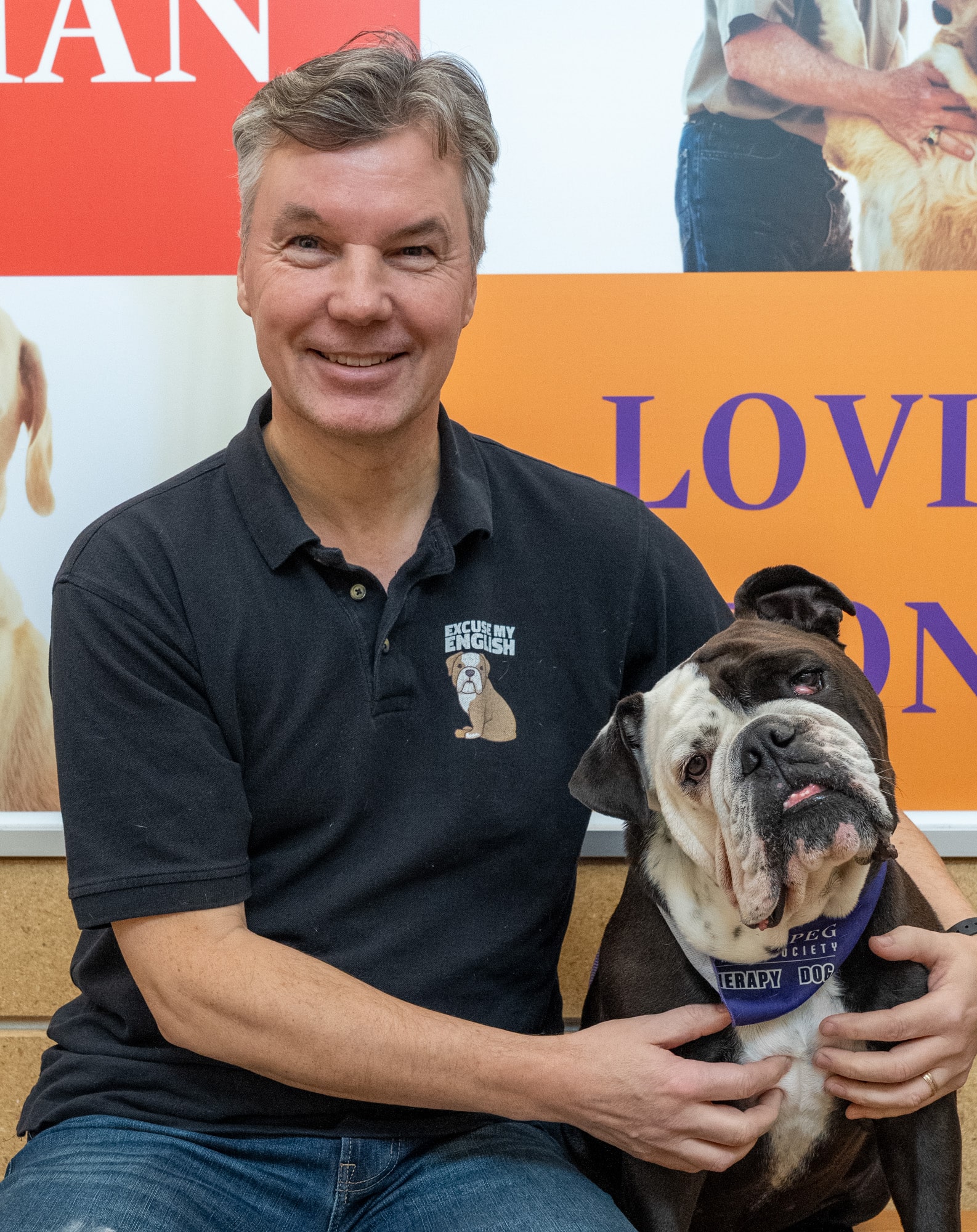
MONTHLY VOLUNTEER PROFILE: TIM & GORDON

Editor’s Note: For personal and professional reasons, this month’s Winnipeg Humane Society MVP has requested anonymity, so we’ll just call him Tim.
Tim has been volunteering with the WHS for approximately one year. His three-year-old English Bulldog Gordon is also a WHS therapy dog. Their story will be told mainly from the perspective of Gordon.
“About a year ago Tim and I came to the Winnipeg Humane Society,” Gordon recalls. “Dad had wanted to find something for us to do together that was fun for us both.
Also, I’m a working dog by nature so it’s good for me to keep my 60 pounds of muscle in trim shape. Tim had met some volunteers from the WHS and it was recommended as a good place for us. He got in touch and before long we were there, taking tests and training so that I could become a therapy dog.”
Gordon and Tim visit schools, seniors’ care homes, and even Stony Mountain Penitentiary to meet with people. Sometimes the visits will consist of going for a walk with Gordon. Other times the people may just want to sit next to Gordon and talk to him or pat him. Most times, Gordon will get his favourite snack – bananas. Through these interactions, they build a connection.
Gordon and Tim also take part in See Spot Read, a literacy-based, animal companionship program that benefits children who are struggling with their reading skills. Participating children read to dogs that are good listeners. “The boy or girl is told I need to have children read to me so I can complete my training course, and they are kind enough to volunteer to read to me,” Gordon explains. “But I like it because I get to sit next to them and relax. And they get more practice reading.”
The visits to Stony Mountain take place once per month and Gordon visits with Best Behaviour inmates who will soon be leaving the institution. Gordon can be a very welcome change to the inmates’ daily routine. They sometimes come into the room with little expectation of a connection, but by the time they’ve spent a few minutes with Gordon, they’re asking if he can come back next week.
Gordon and Tim recently visited a seniors’ home. A resident’s son had just passed away and his family had come in to let him know. The man noticed Gordon and wanted to see him. Gordon sat with the family for 25 minutes while they reminisced about the dogs and the good times they had in the family over the years.
Shortly after, a female resident’s husband had passed, and her family had come in to share the bad news with her. They saw Gordon and wanted to see him. He sat on the woman’s lap and licked her face. She started giggling. “It was a very positive moment that Gordon was able to provide,” Tim says.
So much of their involvement comes down to community and making this a better place for people (and dogs) to live. Their other community participation efforts include taking part in a one-day seminar on therapy at the University of Manitoba. Also, at the U of M, they took part in a Shriner’s fundraiser where they met students who didn’t have a class that day but came to meet Gordon.
A military brat, Tim takes Gordon to sit with a group of veterans occasionally. Some of the vets are recent retirees who are having difficulty transitioning to civilian life. “It’s nice to connect with them,” Tim explains. “Gordon often can be the segue that gets them to open up and start talking about what’s troubling them.”
Tim feels that despite his solid, sinewy build, Gordon is a softie. When Tim, his sons, and Gordon head out together in the vehicle, Gordon settles in on the heated front seat. They share many good times, just like they share this desire to get involved. But Tim is quick to deflect the credit to his four-legged friend.
“He’s the one who’s doing the volunteering and making the difference,” he says. “I’m the chauffeur.”
Gordon might view it as more of a partnership.
We should all try to “Be the person your dog thinks you are.” (J.W. Stephens) It’s a high bar, but one worth reaching for.

